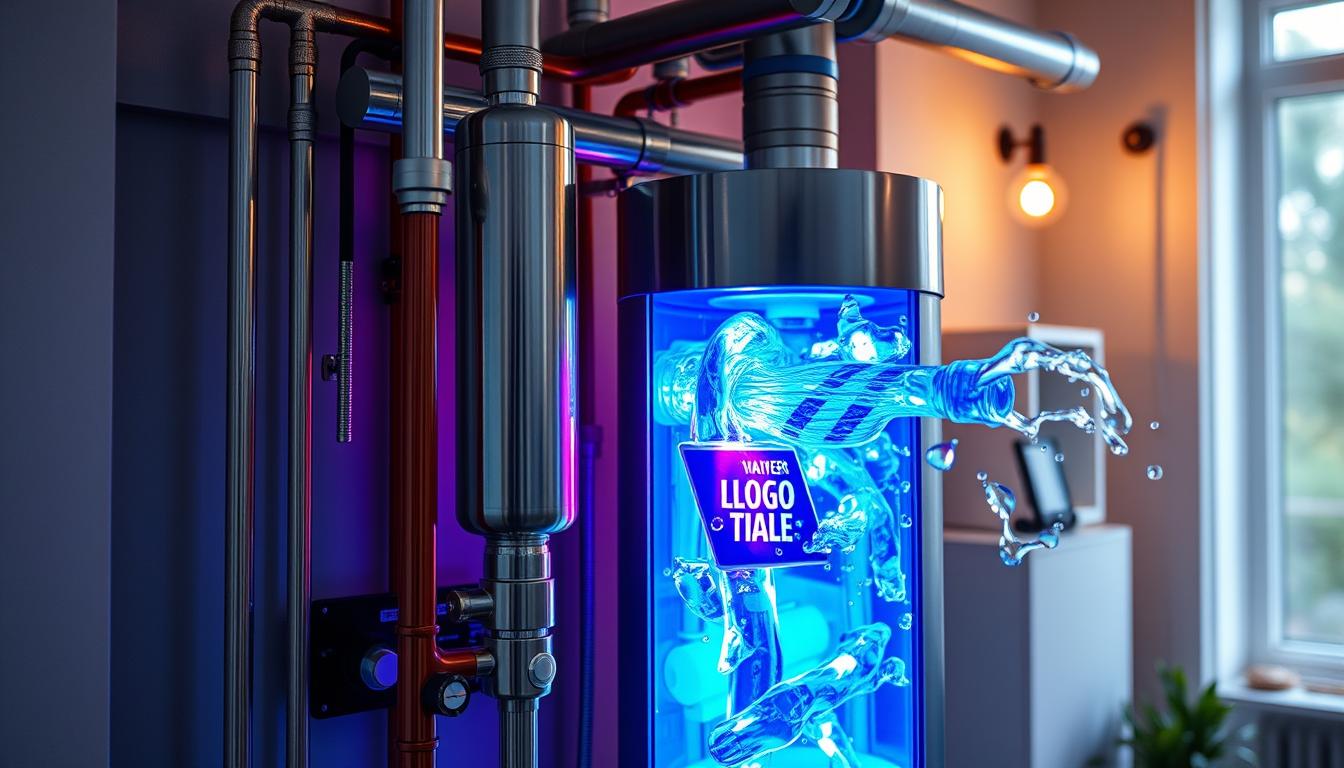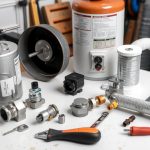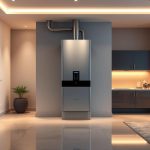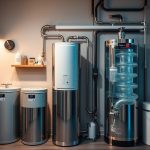Imagine walking into your home on a chilly morning. You feel the warmth of perfectly heated water. This is all without the guilt of high energy bills. The coolant based water heater is a game-changer for homeowners. It offers energy-efficient heating without sacrificing comfort.
Modern homes are moving towards eco-friendly water heating solutions. These solutions promise both great performance and sustainability. The SANCO2 coolant-based water heater is a top choice, being up to 80% more efficient than old electric heaters. This technology changes how we view home energy use.
As energy costs keep going up, homeowners look for smart ways to save. The coolant based water heater is a leading solution. It offers amazing energy-efficient heating. This can greatly cut down on household energy use.
Key Takeaways
- Up to 80% more efficient than traditional electric heaters
- Potential return on investment within five years
- Supports multiple industries from residential to commercial applications
- Environmentally friendly heating technology
- Adaptable to various home and building configurations
What is a Coolant Based Water Heater?

The world of home heating has changed a lot with new tech like the heat pump water heater. These systems are a big step forward in heating water. They are more efficient and better for the planet.
A heat transfer fluid heater works in a special way. It doesn’t make heat itself. Instead, it takes heat from the air or ground around it.
Core Functionality of Coolant Based Water Heaters
Modern coolant based water heaters use smart heat transfer to warm water well. They do this by:
- Getting heat from the air or ground
- Using refrigerant to move thermal energy
- Turning environmental heat into hot water
Distinguishing Features from Traditional Systems
These systems are different from old water heaters. Old ones burn fuel or use electricity. But these new ones use a cool heat exchange process. The main differences are:
| Feature | Coolant Based Water Heater | Traditional Water Heater |
|---|---|---|
| Energy Source | Ambient Environmental Heat | Direct Electrical/Gas Heating |
| Efficiency | 300-400% More Efficient | 80-90% Efficiency |
| Environmental Impact | Low Carbon Emissions | Higher Carbon Footprint |
*”The future of home heating lies in smart, efficient technologies that work with nature, not against it.”* – Energy Efficiency Expert
Learning about these new water heating systems helps homeowners. They can make better choices about energy use and the planet.
Benefits of Using a Coolant Based Water Heater
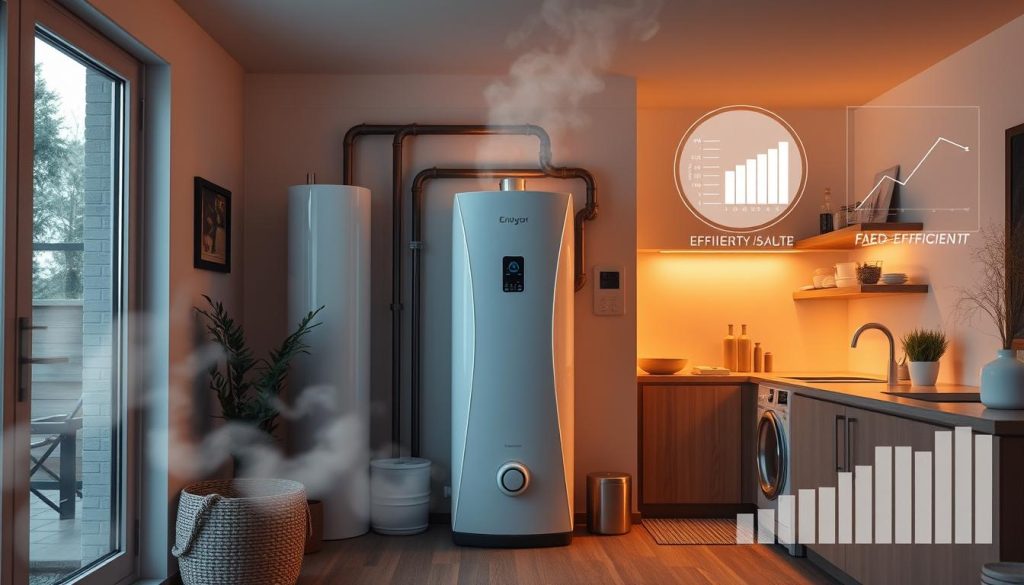
Coolant based water heaters are a new way to heat water in homes. They use less energy than old methods. This makes them a smart choice for hot water needs.
Energy Efficiency Advantages
These heaters are all about saving energy. They can cut energy use by up to 50%. Their design helps in several ways:
- Less heat loss when warming water
- Quick temperature changes
- Smart energy use
Cost Savings Over Time
These heaters save money in the long run. They lower monthly bills by:
- Using less electricity
- Needing less maintenance
- Lasting longer
Environmental Impact
They’re good for the planet too. Coolant based heaters help by:
- Lowering greenhouse gas emissions
- Supporting green energy
- Reducing energy use
“Innovative coolant technologies are transforming how we approach home energy efficiency and environmental responsibility.”
| Performance Metric | Coolant Based Heater | Traditional Heater |
|---|---|---|
| Energy Efficiency | 90-95% | 60-70% |
| Annual Operating Cost | $250-$350 | $450-$600 |
| Carbon Emissions | Low | High |
Investing in a coolant based water heater is a smart move for home energy.
How Coolant Based Water Heaters Work

Modern heat pump technology has changed water heating systems. It offers new ways to warm water for homes and businesses. These devices use advanced heat transfer to warm water efficiently.
Coolant-based water heaters work by using heat exchange. They take heat from the air or ground. This changes how we make hot water.
The Cooling Process Explained
Coolant-based water heaters use a complex heat transfer method:
- Absorb ambient heat from air or ground
- Transfer thermal energy using refrigerant
- Circulate heat through specialized exchangers
- Convert absorbed energy into usable hot water
Heat Exchange Mechanism
The heat exchange process involves complex interactions between thermal components:
| Component | Function | Temperature Range |
|---|---|---|
| Refrigerant | Absorb and transfer heat | -20°F to 200°F |
| Heat Exchanger | Convert thermal energy | Up to 190°F |
| Water Storage Tank | Store heated water | 120°F – 160°F |
“Coolant-based water heaters represent a breakthrough in efficient thermal energy management.” – Thermal Engineering Institute
These systems use advanced heat pump technology. They are good for the environment and save energy. They make hot water without using a lot of energy.
Types of Coolant Based Water Heaters
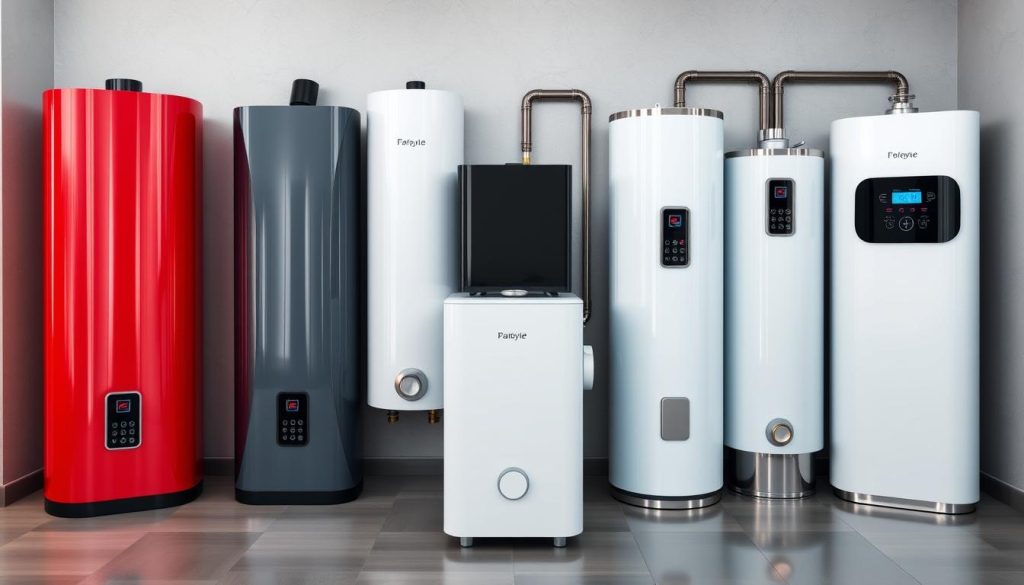
Water heating technology has come a long way. Now, homeowners have many options for hot water. Coolant based water heaters are a new way to heat water at home and in businesses. They come in different types to fit different needs.
Electric vs. Gas Water-Cooled Water Heaters
When looking at tankless water heaters, you can pick electric or gas models. Each has its own benefits:
- Electric models are cleaner and simpler to install
- Gas models heat water faster
- Electric water heaters are great for small spaces
- Gas systems are best for places that need a lot of hot water
Tank vs. Tankless Configurations
Choosing between tank and tankless water heaters affects how well your home heats water:
| Feature | Tank Water Heater | Tankless Water Heater |
|---|---|---|
| Storage Capacity | Stores 40-80 gallons | Heats water on demand |
| Energy Efficiency | Lower efficiency | Up to 34% more efficient |
| Initial Cost | $500-$1,000 | $800-$1,500 |
| Lifespan | 10-15 years | 20+ years |
Tankless water heaters are the future of hot water. They are more efficient and last longer.
“Innovative water heating solutions are changing how we think about comfort and energy use.” – Energy Efficiency Expert
Installation Considerations

Installing a coolant based water heater needs careful planning and skill. Whether you choose professional help or do it yourself, knowing the key steps is vital for the best results.
Professional Installation vs. DIY Setup
Water heater installation is complex. Professional installation has many benefits:
- Precise system integration
- Proper safety compliance
- Accurate sizing and placement
- Warranty protection
“Proper installation can improve system efficiency by up to 30%,” according to renewable energy experts.
Site Assessment Requirements
A detailed site assessment is key for a successful installation. Important factors include:
- Available air space (minimum 1,000 cubic feet)
- Temperature range (40-90°F optimal)
- Existing plumbing infrastructure
- Electrical system compatibility
Critical Installation Considerations
Professional installation handles important details well:
- Use Teflon tape for leak-free pipe connections
- Verify metric-to-NPT conversion for plumbing
- Check coolant system integration
- Ensure proper ventilation
While DIY setup might seem cheaper, coolant systems are complex. They often need a pro to ensure they work right and safely.
Maintenance of Coolant Based Water Heaters
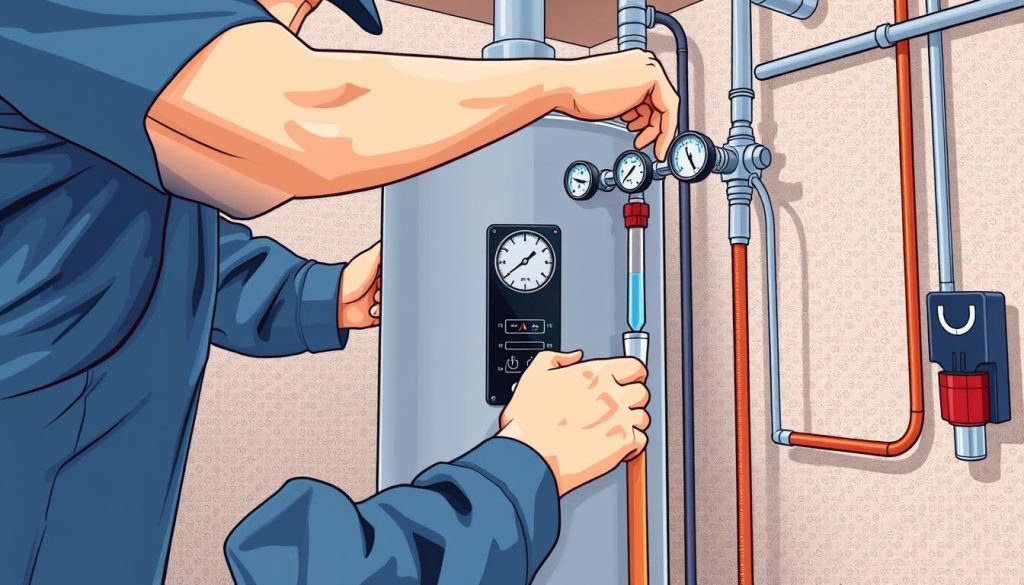
Keeping your water heater in top shape is key for its long life and good performance. Regular check-ups on your heat pump can stop sudden failures and make your equipment last longer.
Keeping your coolant system in good condition needs more than just looking at it. Homeowners should pay attention to a few important areas to keep their water heaters working well.
Essential Routine Maintenance Tips
- Inspect the evaporator coil every six months for dust or debris buildup
- Check refrigerant levels using professional testing equipment
- Clean or replace air filters quarterly
- Verify electrical connections are secure and free from corrosion
- Test pressure and temperature relief valves annually
“Regular maintenance is the key to preventing costly water heater repairs and ensuring consistent performance.”
Common Issues and Professional Fixes
Coolant-based water heaters can face several common problems that need expert help. Issues like not heating well, often in cold weather, can be due to:
- Inadequate insulation
- Improper system placement
- Low refrigerant levels
- Blocked air intake or exhaust
Experts say fixing these problems quickly is important to avoid long-term damage and keep the system running well.
Diagnostic and Preventative Strategies
Having a detailed maintenance plan helps spot problems early. Think about getting professional checks every year. These can include:
- Comprehensive system diagnostic testing
- Refrigerant level verification
- Electrical system evaluation
- Efficiency performance measurement
By regularly maintaining your water heater, you can make it last longer and work better.
Cost Analysis: Coolant Based Water Heaters

Understanding the costs of coolant based water heaters is key. It’s not just about the price you pay at first. Homeowners want to find a balance between the cost upfront and the savings over time.
Initial Investment Breakdown
The cost to start with a coolant based water heater is between $1,000 and $3,500. This price can change based on a few things:
- System size and how advanced it is
- How well it fits with your home’s setup
- The cost of hiring a pro to install it
- The brand and what kind of warranty it offers
Long-term Savings
Even though the initial cost is high, the savings over time are worth it. These water heaters are very good at saving energy, with an average efficiency of 2.3.
Getting a high-efficiency coolant based water heater can cut your yearly energy bills by up to 50% compared to old systems.
Cost-Influencing Factors
Several things can affect how much a coolant based water heater costs:
- The cost of electricity where you live
- How much hot water you use
- What maintenance it needs
- Any tax breaks or energy savings programs you might get
These water heaters can pay for themselves in about five years. They also come with warranties that last 10-15 years. So, they’re a smart choice for homeowners looking to save money in the long run.
Choosing the Right Coolant Based Water Heater
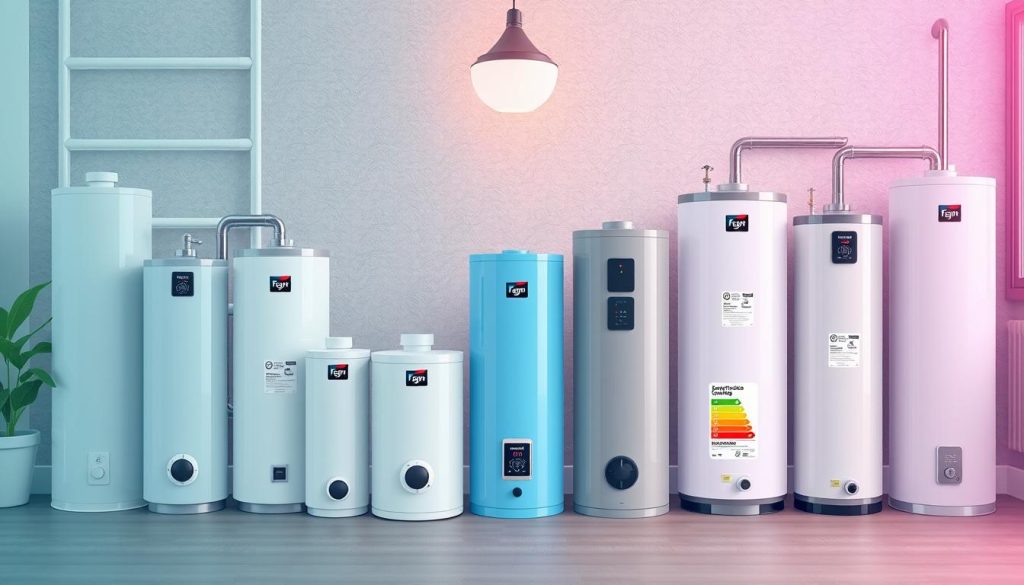
Choosing the perfect water heater can be tough for homeowners and RV fans. It’s important to think about many factors for the best performance and efficiency.
Looking at the best coolant heaters, some key things stand out. The right heater depends on your specific needs, whether at home or on the move.
Essential Features to Consider
- Energy efficiency ratings
- Total heating capacity
- System compatibility
- Installation requirements
- Climate adaptability
Top water heater brands have many options for different places. For RV users, special heating systems are key for a cozy stay.
Leading Brands in the Market
| Brand | Specialty | Best For |
|---|---|---|
| Webasto | Vehicle Integrated Systems | RV Heating |
| Espar | Diesel Heating Solutions | Cold Climate Performance |
| Rheem | Residential Water Heaters | Home Applications |
Professional tip: Always check the manufacturer’s specs and compatibility before you decide.
Investing in the right water heater can provide years of reliable hot water and significant energy savings.
Safety Considerations

Water heater safety is very important for homeowners. Coolant system risks can pop up without warning. So, regular safety checks are key to keeping your home and family safe.
Knowing about safety risks helps avoid dangerous situations. Keeping your water heater in good shape and staying informed is essential. This way, your system works well and safely.
Addressing Possible Risks
- Check for refrigerant leaks regularly
- Inspect electrical connections
- Verify proper ventilation
- Monitor coolant quality and levels
“Safety isn’t expensive, it’s priceless” – Unknown
Why Regular Safety Inspections Matter
Regular safety checks are vital for your water heater’s health. Experts say get a professional check-up every year. This helps catch problems early, before they get worse.
| Inspection Focus | Frequency | Recommended Action |
|---|---|---|
| Coolant Levels | Annually | Professional assessment |
| Electrical Connections | Every 6 months | Visual and functional check |
| Ventilation System | Annually | Clean and verify proper airflow |
By focusing on water heater safety, homeowners can avoid risks. This ensures their coolant-based water heating system runs smoothly.
Coolant Based Water Heaters and Hydronic Heating
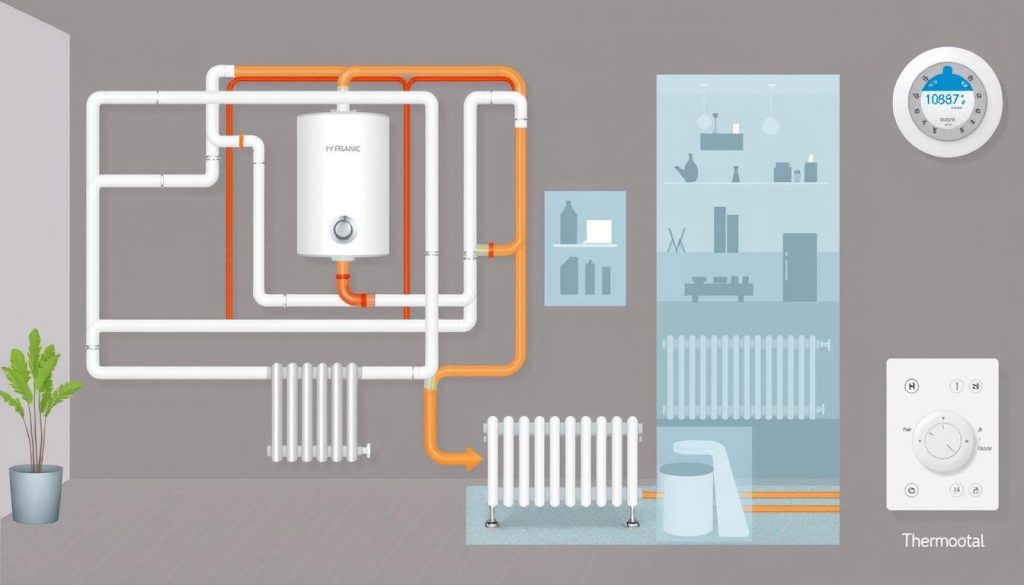
Integrated water heating technologies have changed how we keep our homes comfortable and efficient. Hydronic heating systems are a smart way to keep your home at a steady, cozy temperature.
Today’s hydronic heating systems use coolant based water heaters for top-notch performance. These systems blend different technologies to offer better heating solutions.
Seamless Integration in Heating Systems
Adding coolant based water heaters to hydronic systems brings big benefits:
- They make your home heating more energy efficient
- They keep the temperature even everywhere
- They use less energy overall
- They work well in different areas of your home
Advanced Technology Benefits
Modern hydronic heating systems offer amazing features, like:
- They last up to 5,000 hours
- They are quiet, perfect for places where noise is a problem
- They keep your home warm even when the main heat is off
- They are easy to set up, with a simple plug-and-play design
Advanced hydronic heating is the future of efficient home heating.
By using coolant based water heaters with hydronic systems, homeowners get integrated water heating. This combo boosts comfort and cuts down on energy use. These systems work well in many climates, keeping your home warm from -15°C to 45°C.
Comparison with Other Heating Systems

Choosing the right water heater means knowing the differences between electric, gas, and coolant systems. These differences can greatly affect your home’s energy use.
Today’s homeowners have many choices for water heating. Electric vs. coolant heaters have their own benefits, depending on your home’s needs.
Electric Water Heaters: Efficiency and Limitations
Electric water heaters are very efficient:
- They convert almost all electricity to heat.
- They make about 95 watt-hours of heat from 100 watt-hours of electricity.
- They are easy to install.
- They are cheaper upfront.
Gas vs. Coolant Heaters: Performance Comparison
| Feature | Gas Heaters | Coolant-Based Heaters |
|---|---|---|
| Energy Efficiency | 70-80% | 300-400% |
| Operating Cost | Higher | Lower |
| Carbon Emissions | Higher | Reduced |
| Heating Speed | Faster | Moderate |
Coolant-based water heaters save a lot of energy over time. Heat pump technologies can be 300-400% efficient. This means they cost less to run than other heating methods.
Smart homeowners know that spending more upfront can save a lot of money later.
Deciding between electric, gas, and coolant water heaters depends on your home, local energy prices, and the environment. Getting a professional energy check can help find the best choice for you.
Environmental Benefits
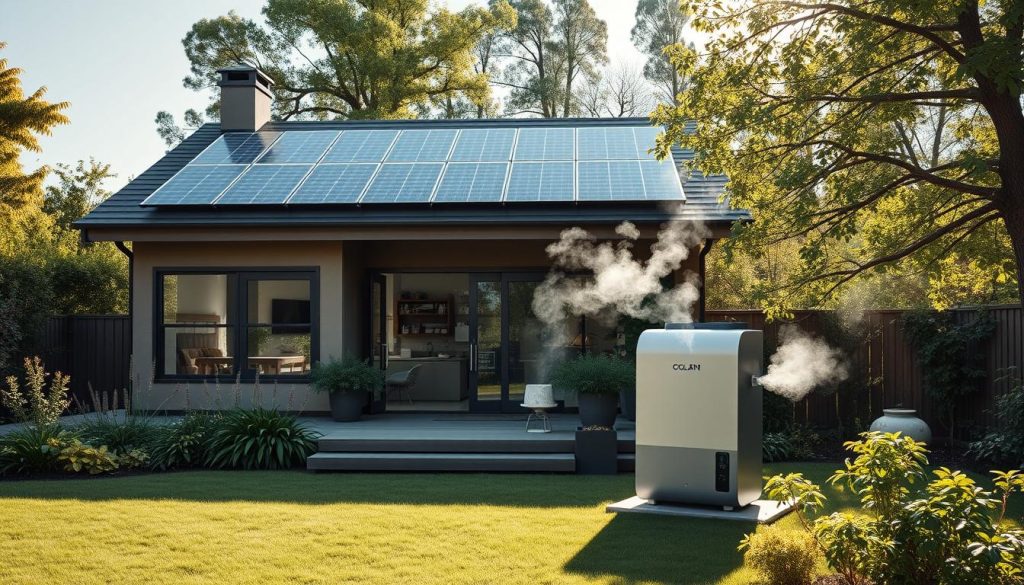
Eco-friendly water heating is key to making homes more sustainable. Coolant based water heaters have big environmental pluses. They cut down carbon footprints and manage heat well.
Reduced Carbon Footprint
Low-emission water heating is good for the planet. Water cooling systems are super efficient, moving heat 3000 times better than air. This means big energy savings:
- Needs less than 10% electrical energy compared to old systems
- Works quietly without fan motors that use a lot of energy
- Works well in many different weather conditions
Sustainable Heating Solutions
Coolant based systems are great for the environment. They work well with renewable energy, helping save the planet.
| Environmental Metric | Coolant Based Water Heaters | Traditional Systems |
|---|---|---|
| Energy Efficiency | Up to 300% efficiency | 100-150% efficiency |
| Carbon Emissions | Significantly Reduced | Higher Emissions |
| Operational Complexity | Low Maintenance | Higher Maintenance |
“Sustainable technology is not just about innovation, but about creating responsible solutions for our planet’s future.” – Environmental Technology Research Institute
Advanced coolant technologies are a big step in eco-friendly water heating. By using these low-emission systems, homeowners help the environment and save on energy costs.
Innovations in Coolant Based Water Heaters

The world of water heating is changing fast. New technologies and smart designs are leading the way. These changes focus on being more efficient, green, and clever.
Advanced coolant systems are changing water heating. In the last few years, we’ve seen big steps forward:
- Intelligent thermal management systems
- Enhanced heat pump technologies
- Smart control integration
- Reduced environmental impact solutions
Emerging Technologies
Companies are making cooler water heating solutions. The Coolant Control Hub max is a big leap forward. It brings big improvements:
| Innovation Feature | Performance Improvement |
|---|---|
| Refrigerant Reduction | Over 80% decrease |
| Coolant/Refrigerant Valve Elimination | 50% reduction |
| System Weight Reduction | Approximately 20% |
Future Trends in Heating Solutions
The future of water heating is looking greener and more efficient. We’re seeing:
- Integration with home automation systems
- Use of natural refrigerants
- Enhanced energy conservation technologies
- Adaptive smart control mechanisms
“The next generation of water heating solutions will prioritize efficiency, sustainability, and intelligent design.” – Energy Innovation Research Institute
New ideas like forced circulation engine heaters show great promise. They can save up to 35% energy compared to old heaters.
Customer Experiences and Reviews
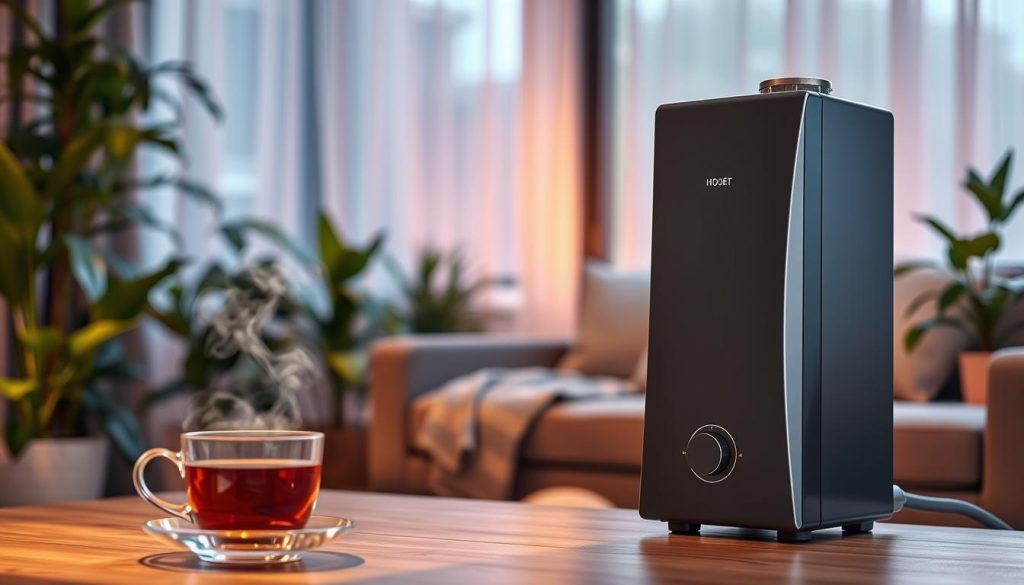
Water heater reviews offer interesting insights into coolant-based systems. Homeowners and RV fans share their experiences. They talk about how well these systems work and save energy.
People share how these new water heaters make their lives easier. They love the:
- Exceptional energy efficiency
- Impressive temperature control
- Long-term cost savings
Case Studies of Users
RV owners give great advice on heating systems. The Isotemp Slim Square Water Heater is a favorite. It has:
- 25-liter capacity
- Maintains hot water up to 12 hours after driving
- Electric heating element of 750 watts
“The water heater’s performance exceeded my expectations, even on long camping trips.” – Mark Stevens, RV Enthuasiast
Expert Opinions on Performance
Experts say the right size and installation are key. They praise coolant-based heaters for being eco-friendly and efficient. They note the higher upfront cost compared to old systems.
They point out the systems’ strengths. They can heat water to 190 degrees quickly. Startup is fast, in just two seconds.
Conclusion: Is a Coolant Based Water Heater Right for You?
Choosing a water heater is a big decision. You need to think about what heating system you want and what works best for your home. Coolant based water heaters are a new option for homeowners looking for better heat control. They work well in many places, like homes, RVs, and boats.
Cost is important when picking a water heater. Prices range from $350 to $928. Knowing your budget and how much you’ll save on energy is key. The Eberspacher Espar and Kuuma models show there’s a good choice for every budget, without sacrificing quality.
Getting a coolant based water heater installed and maintained right is essential. Things like coolant quality, system size, and where you live affect how well it works. The water you use must be just right to avoid damage and keep the system running smoothly.
Final Considerations
For those looking for efficient heating, coolant based water heaters are worth a look. Think about what you need, talk to HVAC experts, and compare different models. Your choice should consider upfront cost, energy use, and long-term expenses for the best heating solution.
